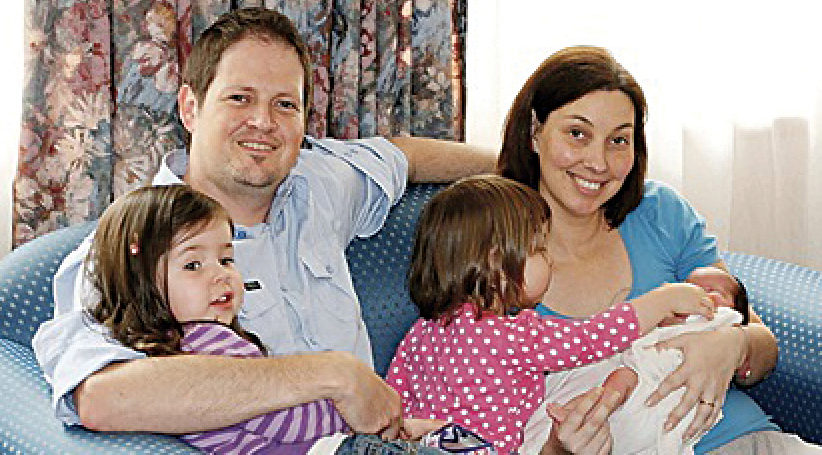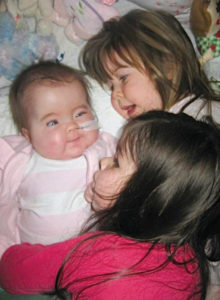Lilah’s legacy a reminder of the sanctity of life
People
As the SA Parliament debates a bill that would enable abortions up until full term provided two doctors consent, Andrea Bishop spoke about her decision to go against the advice of medical professionals and give birth to Lilah Sophie. Despite living for less than two years, Lilah’s positive impact continues today.

Lilah Sophie Bishop would have been 11 years old last month. Her parents, Andrea and Nic, and sisters Jemima, 14, and Madeleine, 12, celebrated in their usual way – with a cake, toenail painting and singing by her graveside at dusk.
They also made an $1100 donation to the Childhood Cancer Association, the amount matching her age. Since she died in 2009 they have donated the money they would have spent on birthday and Christmas presents to charities, including the Women and Children’s Hospital Foundation, bikes for girls in Sudan to ride to school, an all girls’ school in Afghanistan and teacher training for Indigenous women in the Northern Territory.
Advertisement
But Lilah’s legacy is much more than that.
“Nic and I agreed from the start that only positives will come from this,” explained Andrea, a Catholic school educator.
“Even though she’ll spend time in hospital, even though there will be sad times, these experiences make you see things differently.
“You see the good in people, you value time and people differently, you parent your children differently. She keeps enabling us to support people in various ways. I would never change that. She was a gift from God and she was chosen for us, and us for her.”
But Andrea admits that the odds were stacked against Lilah, not just because she had a massive brain tumour leaving only eight per cent of her brain functioning and a five per cent chance of survival.
From 22 to 27 weeks into the pregnancy, it was suggested to Andrea to have an abortion at least seven times by a range of medical professionals.
“I lost count after that,” said Andrea, adding that each time the answer was an emphatic “no”.
“It was adding unnecessary stress – how many times do I have to say no?
“By 22 weeks my belly was out there, I was quite visibly pregnant.
“It’s so insulting when someone is strongly encouraging you to abort, especially when you are a person of faith.
Andrea said all she wanted was advice on the brain tumour surgery and she told her neurosurgeon “if I wanted advice about faith I’d see my priest so could he get on with telling us about his area of expertise”.
By 27 weeks, everyone had “got the message” and with the help of a neutral party they ensured all their medical records clearly indicated their position on aborting.
Andrea said it was important for someone in her position to not just be told they could have an abortion.
“It isn’t a certain doctor’s place to put the idea into a person’s head if you’re carrying a terminal ill baby and leave it at that,” she said.
Advertisement
“Am I going to have this child and live with this child for as long as I can? That’s a question that needs appropriate consultation, not this passer-by information.
“Everyone we met had an opinion but we did not seek it.”
Andrea said she felt like they were “ducking and weaving” and “almost scorned by professionals, especially if you went down the faith line”.
“You felt like you had to defend your faith.”
Andrea believes her situation highlights the danger of Parliament legislating to enable someone to end life.
“I don’t think there should be a blanket rule about life in any situation, I don’t think Parliament is the place for that,” she said.
“Everything else is about protecting life, wearing helmets and seatbelts, why is this about killing someone?”
She also said there should be “a lot more steps” put in place other than the consent of two doctors, such as counselling and information about palliative care for terminally ill babies.
“I always changed the language, when a person said abortion I replaced that with murder,” she said.
“When you look at the scans of your beautiful baby, who is perfect in every way but one – sucking her thumb, waving at you, curled up – I can’t fathom denying life, I don’t get it.”
Lilah’s birth was brought forward to 31 weeks so that Andrea could have her naturally and after a long, complicated delivery unrelated to Lilah’s illness she couldn’t believe it when she heard Lilah cry.
“If she’s crying she must be breathing,” I thought.
“We didn’t delude ourselves though. We were sure we weren’t bringing her home, we didn’t even have a nursery for her. Every day was a bonus.”

Lilah with her sisters.
Andrea said while the neurosurgeon never said much, she was sure Lilah became his favourite patient.
“She was a cheeky little monkey, he’d lie her on the bed in his rooms and she’d kick her legs up and pull on his tie so his face was close to her and she’d grab his nose. ‘Oh Lilah, Lilah, Lilah’ he’d say. As if to say ‘what are we going to do with you’. Nic and I would have a little smirk behind his back.”
Lilah not only did things they never thought she would be able to do, like giggle and say ‘mamma’, she spent most of her life at home with the family, being held by her sisters and lying on the floor with the pet dog and cat “lolling all over her”.
As a friend once said to Andrea, “Lilah was loved to life”.








Comments
Show comments Hide comments